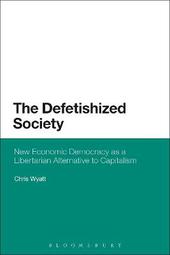
|
The Defetishized Society: New Economic Democracy as a Libertarian Alternative to Capitalism
Paperback / softback
Main Details
| Title |
The Defetishized Society: New Economic Democracy as a Libertarian Alternative to Capitalism
|
| Authors and Contributors |
By (author) Chris Wyatt
|
| Physical Properties |
| Format:Paperback / softback | | Pages:256 |
|
| Category/Genre | Political economy |
|---|
| ISBN/Barcode |
9781623567224
|
| Classifications | Dewey:330.126 |
|---|
| Audience | | Tertiary Education (US: College) | | Professional & Vocational | |
|---|
|
Publishing Details |
| Publisher |
Bloomsbury Publishing Plc
|
| Imprint |
Bloomsbury Academic USA
|
| Publication Date |
23 May 2013 |
| Publication Country |
United States
|
Description
New Economic Democracy establishes a self-governing civil society, unifying the private sphere of production and the public sphere of citizenship within a non-statist scheme of communal ownership. It provides the premises to seeking a solution to Marx's fetishism of commodities. Only a thorough restructuring of the economic and political institutions can provide the social climate in which the phenomenon of fetishism can be transcended. Defetishizing the commodity implies reversing the concealment of the social relations through which commodities are produced and preventing the tendency to bestow magical characteristics to commodities. The key imperative to the defetishized society is a system of genuinely democratic institutions. iprovides this necessary corrective and also challenges the prediction that politico-economic organizations, like worker cooperatives, are destined to be dominated by the dictates of oligarchs. The explanatory approach of Marx's concepts combined with an original argument will make the book a valuable research tools to students and researchers in political theory, democratic theory, and political economy.
Author Biography
Chris Wyatt is lecturer in Social Theory and Sociology at the University of Brighton, UK. He is also affiliated to the University of Sussex, where he teaches Modern Political Thought and Contemporary Political Theory. He holds a Bachelor of Arts degree in Sociology, a Master of Arts degree in Social and Political Thought and a Ph.D. in Social and Political Thought. He is the author of The Difference Principle Beyond Rawls (Continuum, 2008).
Reviews"Wyatt's book is topical and important. Well-informed and clearly written, it describes a radical economic and political alternative to the the sorry present disorder. He draws on G. D. H. Cole's libertarian socialism, Rawls's work on the equitable distribution of resources, and Marx's ideas on commodity fetishism. The resulting synthesis provides provides a powerful argument for a New Economic Democracy which would provide an alternative cooperative mode of production and. equally important, a corresponding mode of consumption. If enough people read this book, and act on it, there is hope for us yet." - David Mclellan, Professor of Political Theory, Goldsmiths College, University of London, UK. "The Defetishized Society analyses our commodified lives, both through Marx's theory of commodity fetishism and the fetishism of commodities we see in everyday society today. But Chris Wyatt does not just interpret the world. He also looks at how to change it. His book goes argues for a system of economic democracy that exposes commodity fetishism. Wyatt's libertarian socialist approach offers an alternative to both the libertarianism of the right and the statism of the left.This book is important, sophisticated and relevant. It is embedded in a solid theoretical grounding but also attuned to concrete contemporary realities. It is academically sound and sophisticated yet also develops political implications and practical possibilities." -Luke Martell, Professor of Political Sociology, University of Sussex "Capitalism is in crisis, but all the alternatives appear to be discredited. The Defetishised Society is a remarkable achievement that indicates the preliminary steps beyond this impasse. Chris Wyatt demonstrates the contemporary relevance of Marx's critique of alienation, reification, and fetishism. But he goes beyond Marx and critique by showing how advanced capitalist societies can draw on reserves of libertarian potential to move beyond the crises of technocratic capitalism, stagnant social democracy and state socialism in decline. The book will surely be one of the most important works of political theory for years to come."- Darrow Schecter, University of Sussex
|